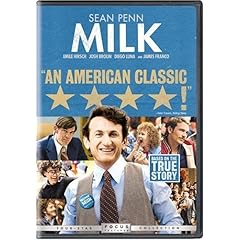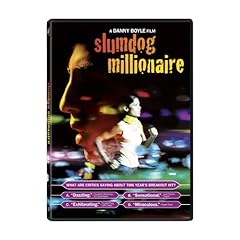 Milk (2009, Focus Features/Universal)
Milk (2009, Focus Features/Universal)
purchase this film from Amazon: DVD | Blu-ray
For any film fan, there’s no pleasure quite as distinctive as sitting down to watch a new movie from a director you know you can not only trust, but whose work boasts its own distinctive visual style. The advent of digital film and the increasingly corporate culture of the major studios have helped weed a lot of the more idiosyncratic directors out of the system, but there are always at least a few of them on the landscape, and 2008 saw new releases from three of them: Christopher Nolan (The Dark Knight), Gus Van Sant (Milk), and Danny Boyle (Slumdog Millionaire). As luck would have it, all three of them were sizable hits, and all of them earned some measure of attention from the Academy during Oscar season. TDK has been out on DVD and Blu-ray for some time now, and by the end of March, both Milk and Slumdog will have joined it on the home market.
Milk, the Sean Penn-led biopic of trailblazing San Francisco politician Harvey Milk, reached store shelves on the 10th, just in time for the last bit of Oscar buzz to give the Best Picture contender a boost on the sales and rental charts. Penn, of course, earned an Academy Award for his portrayal of Milk, and for good reason — as is his wont, Penn doesn’t play the character so much as he inhabits him, disappearing inside Milk’s distinctive mannerisms and New York accent — even his hairstyle — until you no longer really see him. Penn’s near-exclusive focus on serious roles is easy to mock, and I certainly wouldn’t complain if he pulled another Spicoli out of his bag before he’s through, but there’s no denying he does excellent work. For an actor this well-known to vanish inside a public figure as iconic as Milk requires truly impressive actorly prestidigitation.
Penn got most of the attention, but Milk‘s biggest asset is probably Van Sant’s eye; his restless camera meshes well with the archival footage used in the film, and the saturated, bleached-out look he uses helps the movie retain an uncommon degree of warmth for what is, ultimately, a garden-variety biopic with a stellar pedigree. Harvey Milk is an American hero, and Van Sant does an admirably nimble job of retracing his steps from cautiously closeted New York professional to political firebrand, but he never really gets inside Milk the way Penn does; no matter how beautifully filmed and performed they are, the details of Milk’s life still feel like points on a curve. Van Sant’s camera entranced me, and his stellar cast (which also includes Josh Brolin, Emile Hirsch, and James Franco, all of whom turn in wonderful performances) impressed me, but Milk rarely moved me; for a truly heavyweight look back at the man, I’d still recommend Rob Epstein’s The Times of Harvey Milk.
Part of the problem is that Milk is a biopic, and like a lot of biopics, it has to walk a line between offering an accurate picture of its subject and truly absorbing drama. Van Sant and his crew went to a lot of trouble to maintain accuracy, right down to the San Francisco storefronts in the exterior shots and the fashions worn by Milk and his peers, but by hewing so closely to the known details of Milk’s life, the movie keeps us at arm’s length. Perhaps realizing this, Van Sant tries to raise the stakes in places, but it feels wrong. He frames the picture with shots of Milk recording a sort of last will and testament — a device that feels phony even though Milk actually did it — and ladles thick layers of heavy-handed symbolism and melodrama over the assassination that ended Milk’s life. After two hours of living with Harvey Milk, just watching as he’s shot to death by his fellow city supervisor, Dan White, should be painful enough for any audience; Van Sant didn’t need to draw parallels to Tosca while he was at it. This sequence suggests (to me, anyway) that Van Sant doesn’t trust his audience, and the sour taste it left lingered long after the closing credits. (The ending, it must be said, is very moving — but it includes footage from the real-life candlelight vigil that was held by 30,000 San Francisco residents to commemorate the lives of Milk and White’s other victim, Mayor George Moscone, and if you can watch any candlelight vigil without being moved, you’re made of steelier stuff than I.)
 Slumdog Millionaire (2009, 20th Century Fox)
Slumdog Millionaire (2009, 20th Century Fox)
purchase this film from Amazon: DVD | Blu-ray
Much more successful, in my opinion, is the film that ultimately won Best Picture, Danny Boyle’s Slumdog Millionaire. I am, admittedly, rather biased; though I’m a music guy more than a movie guy, Boyle is one of the few directors whose name is enough to get me to plunk down full ticket price for a movie. They aren’t always successful (hello, Sunshine), but there’s nothing quite like a Danny Boyle movie — no one else blends dazzling beauty with heart-pounding action and larger-than-life melodrama with so much obvious glee, and very few directors are able to hop from genre to genre with half as much dexterity.
Slumdog famously almost didn’t receive theatrical distribution, which sounds like yet another example of corporate Hollywood stupidity until you stop to consider that the plot uses the Indian version of Who Wants to Be a Millionaire? as a backdrop; even Boyle admits that when he heard that, he had reservations about taking on the project, and if the script hadn’t been written by Simon Beaufoy, Boyle might not have even read it. And really, the story — about the ways in which the lives of three Mumbai kids intertwine over the space of 11 years, and the love story that develops between two of them — could easily have been mismanaged on its way to the big screen. Slumdog needed a director who could swing from the streets to the high rises of India with equal fervor and affection — someone who could act as an empathic guide for the audience — and Boyle fit the bill.
Slumdog stitches together various bits of Boyle’s repertoire — he gets great performances out of his junior castmembers, as he did in Millions, stages action set pieces with flair, as he did in 28 Days Later, and gives the whole thing a brilliant glow, as he’s done in pretty much every movie he’s ever made — but the seams are invisible; the movie sweeps you up in an unapologetically corny embrace, and doesn’t let you go until the final chords of the ludicrously wonderful dance number that plays over the closing credits. Dark Knight fans may disagree, but this is the film that deserved to take home the Best Picture trophy this year.
Both Milk and Slumdog come with a small handful of bonus features on DVD that run the gamut from the expected (inessential deleted scenes) to the mildly diverting (making-of docs). Milk has already come under fire for skimping on the extra stuff, and Slumdog doesn’t do much better, but that’s what the inevitable Special Edition sets are for, right?

![Reblog this post [with Zemanta]](http://img.zemanta.com/reblog_e.png?x-id=0d2d2d04-03cd-4f00-a33a-2a8f1f326fea)



Comments